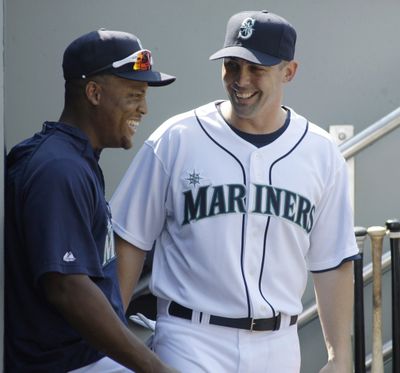Wilson adjusts to new lab
New M’s shortstop treats defense as a science

KANSAS CITY, Mo. — For some players, it is a skill set, a matter of moving where the coaches place you – but for Jack Wilson, defense is a matter of science.
“At the plate, I’m a pest. I put the ball in play, foul off pitches, I can bunt and with two strikes I spread out at the plate and hit different,” the new Mariners shortstop said. “Defense is my thing. I love the science of defense.”
He didn’t always. Back in the mid-’90s, he was a phenom in the St. Louis organization, playing in the Arizona Fall League against another young shortstop and now Seattle teammate, Chris Woodward.
“He was quick, with good hands – if he got to a ball, he made the play,” Woodward said. “He had fast reaction time, and sneaky arm strength. He was pretty darned good.”
With time, Wilson got better.
“I was traded to Pittsburgh and played with the same big league team, in the same division, the same league all my career,” said Wilson, who was acquired in trade last week with the Pirates. “I got to know the opposition pretty well. You know pitchers, you know hitters, you know their tendencies and that helps know where to position yourself.”
An odd thing happened for Wilson a few years ago. He said he found himself observing hitters in a different way. In a more … well … scientific manner.
“I started to watch a batter’s hands and feet, his elbow and shoulders, his swing pass. Then, depending on your pitcher and what pitch he’s about to throw, you know what the hitter is most likely to do,” he said.
“I got good enough that in Pittsburgh, they let me set the infield defense. I moved an outfielder one time and one of the coaches asked why. I showed him the video of the hitter’s first swing and said, ‘Look at that. There’s no way he was going to be able to pull a ball with that swing.’ After that, they trusted me.”
It was more than study in the field. Wilson read up on the opposition.
“If a guy is in a slump, for instance, what’s he going to try to do? Keep the ball up the middle, go the other way. That’s how you try to get out of a slump,” Wilson said. “Pulling the ball gets you into slumps, it doesn’t get you out.
“So if a guy is in a slump, it doesn’t make sense to play him to pull.”
Then, there’s the matter of the pitcher.
“If your pitcher has a good change-up, 90 percent of them are going to be pulled, because guys are going to be out in front of them,” Wilson said. “So you watch each pitch call and adjust, you let your third baseman know what’s coming.”
With the Pirates, the challenge for Wilson and his infield teammates became ground-ball singles. They didn’t want to allow any.
“If it was a ground ball, it doesn’t get through, that was the goal,” Wilson said. “That meant being ready before every pitch. Being focused, intense.
“To me, you drive in runs at the plate, but you can save runs in the field.”
Now, with a new team in a new league, Wilson essentially must start his studies anew.
“I have to adjust not only to hitters and pitchers but to teammates, especially Jose Lopez, my double-play partner,” Wilson said. “And I’ll have to work with a new third baseman, because there’s no sense me shading up the middle if he’s playing the line. You can’t do both successfully.
“You want the third baseman to be with you on every pitch, so you both know what you’re doing.”
Then, there are the pitchers he must face.
“My first four games here I faced three starting pitchers I’d never seen, and an awful lot of hitters I’d only seen on ESPN,” Wilson said. “When we play Texas again, I’ll know their hitters better. That’s how it works.
“The more you see a team, the better prepared you can be.”